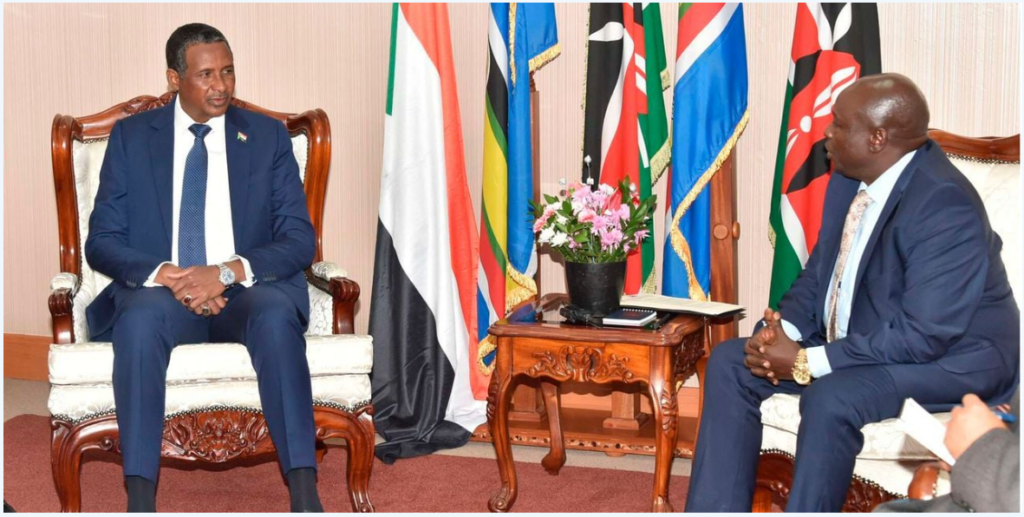As the civil war in Sudan rages on, accusations of foreign interference and economic profiteering have intensified. Among the most explosive claims are those made by Kenya’s former Deputy President, Rigathi Gachagua, who recently accused President William Ruto of engaging in clandestine business dealings with Mohamed Hamdan Dagalo—commonly known as Hemedti—the commander of the Rapid Support Forces (RSF). These allegations have brought into question Kenya’s neutrality in the Sudanese conflict and raised concerns over the ethical implications of its foreign policy.
Background: The RSF and the Sudanese Conflict
Hemedti’s RSF has been one of the main actors in Sudan’s bloody civil war that erupted in April 2023, following a failed power-sharing arrangement between the RSF and the Sudanese Armed Forces (SAF). The RSF has been accused by international bodies—including the UN and Human Rights Watch—of committing egregious war crimes, including ethnic cleansing in Darfur, mass killings, sexual violence, and child soldier recruitment.
Despite these accusations, Hemedti has maintained international relations and continued to profit from Sudan’s vast gold resources, which play a significant role in funding his paramilitary operations.
Allegations of Gold Smuggling Through Kenya
In February 2025, Rigathi Gachagua made headlines when he publicly accused President William Ruto of personal business dealings with Hemedti, specifically involving illicit gold trade. In a televised speech, Gachagua alleged that gold mined in RSF-controlled areas in Sudan was being smuggled through Kenya, with Nairobi serving as a key hub for its export to markets in Dubai.
“They are doing business with the RSF chief, involving gold that is being obtained from that area, brought to Nairobi, and then taken to Dubai,” Gachagua declared, pointing to a direct financial relationship between the Kenyan presidency and the Sudanese warlord.
— Capital FM Kenya
These claims hint at a wider regional network that traffics conflict gold—illegally mined gold that finances armed groups—and suggest Kenya may be playing a more complicit role than previously thought.
The Secret Meeting with Hemedti in Nairobi
According to Gachagua, President Ruto personally directed him to extend an official invitation to Hemedti. The RSF leader subsequently traveled to Nairobi, where he was received and escorted by Gachagua to State House. However, the then-Deputy President revealed that he was not allowed to participate in the closed-door meeting between Ruto and Hemedti.
“If it had anything to do with Kenya, I would have sat through the meeting, but after they were done, I am the one who took him to the airport,” Gachagua noted, implying that the discussions were of a private, possibly commercial, nature.
— Sauce.co.ke
The nature of the meeting remains undisclosed, but its timing—amidst accusations of RSF war crimes and Kenya’s controversial hosting of RSF-led peace charters—has fueled public suspicion.
Kenya’s Diplomatic Fallout with Sudan
Kenya’s engagement with Hemedti has not gone unnoticed by Khartoum. The Sudanese government, led by the SAF, responded with diplomatic outrage when Nairobi hosted Hemedti and later allowed the signing of a political charter by RSF and its allies in February 2025. The charter proposed the creation of a “Government of Peace and Unity” independent of the Sudanese state.
This act was perceived by Sudan’s official government as a violation of its sovereignty, prompting the immediate recall of its ambassador from Kenya.
“Kenya’s decision to host the RSF and facilitate their activities constitutes a breach of international norms and a hostile act against the Sudanese people,” read a statement from Sudan’s Foreign Ministry.
— People’s Dispatch

Implications: Undermining Peace and Profiting from War?
The allegations of gold smuggling and secret dealings with Hemedti carry far-reaching consequences. If proven, they would not only implicate President Ruto in abetting a war criminal but also raise serious questions about the role of Kenyan state infrastructure—such as airports, banks, and customs agencies—in laundering conflict gold.
Moreover, Kenya’s actions threaten its credibility as a regional mediator and may risk international sanctions or reputational damage. Gachagua himself warned of potential retaliatory economic measures from Sudan, including the restriction of Kenyan exports such as tea and coffee.
“We are doing business with a criminal enterprise, and that puts our economy and our standing in Africa at risk,” he said.
— Kenya Insights
Conclusion: A Dangerous Game of Interests
While the full truth behind these allegations remains to be investigated, the situation underscores the dangerous intersection of diplomacy, business, and armed conflict. Kenya, once seen as a bastion of peace in East Africa, now finds itself at the center of a geopolitical storm, accused of enabling and enriching a militia group responsible for atrocities.
As Sudan descends further into chaos, the international community must confront not only the war criminals on the ground—but also those who, under the guise of diplomacy, profit from the bloodshed.
References:

